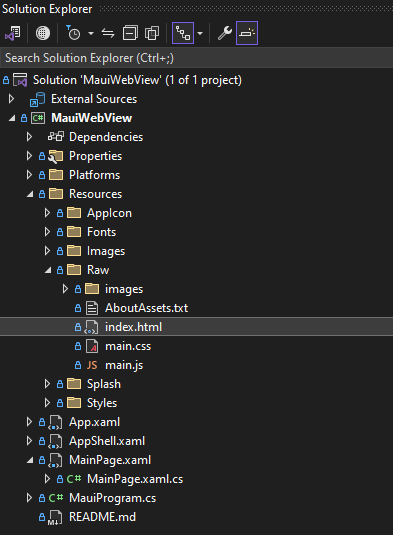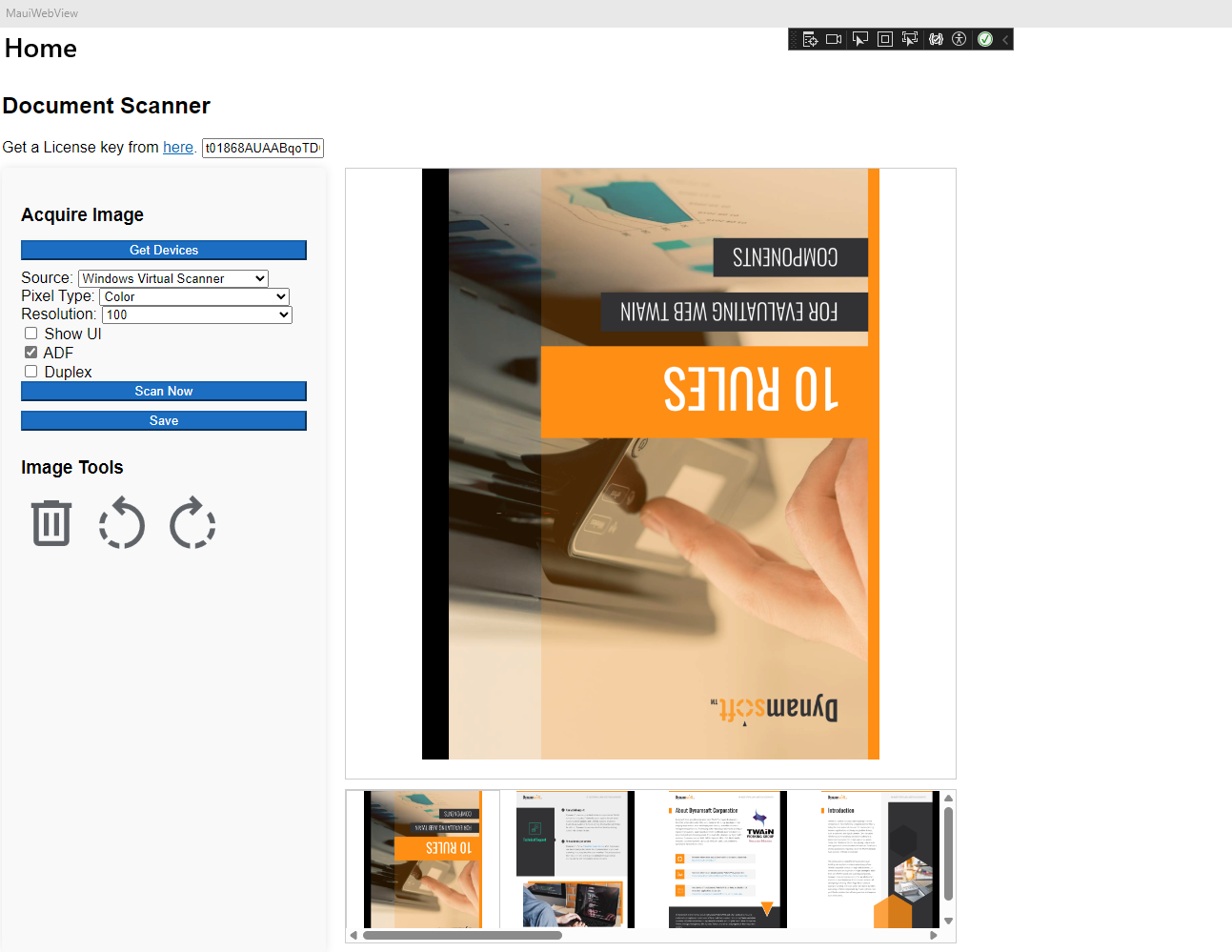Switching from .NET MAUI Blazor to WebView Control for Document Scanning
In .NET MAUI development, both BlazorWebView and WebView are used to display web content, but they serve different purposes and are designed for different scenarios. The BlazorWebView is specifically designed to host Blazor components in a .NET MAUI application, allowing you to reuse Blazor components and share code between web and native applications. The WebView is a general-purpose control for displaying web content, including web pages, HTML strings, and local HTML files. In this article, we will explore how to transition a .NET MAUI Blazor document scanner application to a .NET MAUI application using the WebView control, implementing the document scanning logic in JavaScript and HTML, and enabling interoperation between C# and JavaScript to scan documents and save images.
This article is Part 3 in a 4-Part Series.
- Part 1 - Building a .NET TWAIN Document Scanner Application for Windows and macOS using MAUI
- Part 2 - Developing a Desktop Document Scanner Application with .NET MAUI Blazor
- Part 3 - Switching from .NET MAUI Blazor to WebView Control for Document Scanning
- Part 4 - How to Build a .NET MAUI Windows App to Read Barcodes from Scanned Documents
Prerequisites
- Install Dynamic Web TWAIN Service: This service is necessary for communicating with TWAIN, SANE, ICA, ESCL, and WIA scanners on Windows and macOS.
- Windows: Dynamsoft-Service-Setup.msi
- macOS: Dynamsoft-Service-Setup.pkg
- Request a Free Trial License: Obtain a 30-day free trial license for Dynamic Web TWAIN to get started.
Step 1: Create a New .NET MAUI Project with WebView Control
- In Visual Studio or Visual Studio Code, create a new .NET MAUI project.
-
Open the
MainPage.xamlfile and replace the existing code with the following XAML to add aWebViewcontrol:<?xml version="1.0" encoding="utf-8" ?> <ContentPage xmlns="http://schemas.microsoft.com/dotnet/2021/maui" xmlns:x="http://schemas.microsoft.com/winfx/2009/xaml" x:Class="MauiWebView.MainPage"> <ScrollView> <StackLayout VerticalOptions="FillAndExpand" HorizontalOptions="FillAndExpand"> <WebView x:Name="WebView" VerticalOptions="FillAndExpand" HorizontalOptions="FillAndExpand" Navigating="OnWebViewNavigated"/> </StackLayout> </ScrollView> </ContentPage> -
Open the
MainPage.xaml.csfile and add the following code to set the source of the WebView and handle theNavigatingevent:namespace MauiWebView { public partial class MainPage : ContentPage { public MainPage() { InitializeComponent(); LoadHtmlFile(); } private void LoadHtmlFile() { WebView.Source = "index.html"; } private async void OnWebViewNavigated(object sender, WebNavigatingEventArgs e) { if (e.Url.StartsWith("invoke://callcsharpfunction")) { // TODO: Implement interop between C# and JavaScript } } } }Exaplanation:
- The
LoadHtmlFilemethod sets theSourceproperty of theWebViewcontrol to load theindex.htmlfile. - The
OnWebViewNavigatedmethod is triggered when theWebViewnavigates to a new URL. It checks if the URL starts withinvoke://callcsharpfunctionand, if so, allows for C# and JavaScript interop.
- The
Step 2: Load Static HTML, JavaScript, and CSS Files into the WebView Control
In a .NET MAUI project, you can load static HTML, JavaScript, and CSS files located in the Resources/Raw folder into the WebView. Ensure that the MauiAsset build action is included in the .csproj file:
<ItemGroup>
<MauiAsset Include="Resources\Raw\**" LogicalName="%(RecursiveDir)%(Filename)%(Extension)" />
</ItemGroup>

We create a similar UI layout as the previous Blazor document scanner application in the index.html file.
<!DOCTYPE html>
<html lang="en">
<head>
<meta charset="UTF-8">
<meta name="viewport" content="width=device-width, initial-scale=1.0">
<title>Dynamsoft RESTful API Example</title>
<link rel="stylesheet" href="main.css">
</head>
<body>
<div id="loading-indicator" class="loading-indicator">
<div class="spinner"></div>
</div>
<h2>Document Scanner</h2>
<div class="row">
<div>
<label>
Get a License key from <a href="https://www.dynamsoft.com/customer/license/trialLicense/?product=dcv&package=cross-platform"
target="_blank">here</a>.
</label>
<input type="text" placeholder="licenseKey" id="inputText" class="license-input">
<br />
</div>
</div>
<div class="container">
<div class="image-tool">
<h3>Acquire Image</h3>
<button class="btn btn-primary" id="query-devices-button">Get Devices</button>
<div>
<label for="sourceSelect">Source: </label>
<select id="sources" class="form-control"></select>
</div>
<div>
<label for="pixelTypeSelect">Pixel Type: </label>
<select id="pixelTypeSelectId" class="form-control">
<option>B & W</option>
<option>Gray</option>
<option>Color</option>
</select>
</div>
<div>
<label for="resolutionSelect">Resolution: </label>
<select id="resolutionSelectId" class="form-control">
<option>100</option>
<option>150</option>
<option>200</option>
<option>300</option>
</select>
</div>
<div>
<input class="form-check-input" type="checkbox" id="showUICheckId">
<label class="form-check-label" for="showUICheck">Show UI</label>
</div>
<div>
<input class="form-check-input" type="checkbox" id="adfCheckId">
<label class="form-check-label" for="adfCheck">ADF</label>
</div>
<div>
<input class="form-check-input" type="checkbox" id="duplexCheckId">
<label class="form-check-label" for="duplexCheck">Duplex</label>
</div>
<button class="btn btn-primary mt-3" id="scan-button">Scan Now</button>
<button class="btn btn-primary mt-2" id="save-button">Save</button>
<h3>Image Tools</h3>
<div class="image-tools">
<button id="delete-button" style="border:none; background:none; padding:0;">
<img src="images/delete.png" alt="Click Me" style="width: 64px; height: 64px;" />
</button>
<button id="rotate-left-button" style="border:none; background:none; padding:0;">
<img src="images/rotate_left.png" alt="Click Me" style="width: 64px; height: 64px;" />
</button>
<button id="rotate-right-button" style="border:none; background:none; padding:0;">
<img src="images/rotate_right.png" alt="Click Me" style="width: 64px; height: 64px;" />
</button>
</div>
</div>
<div class="image-display">
<div class="full-img">
<img id="document-image" src="images/default.png" class="scanned-image">
</div>
<div class="row">
<div class="thumb-bar" id="thumb-bar">
<div class="thumb-box" id="thumb-box">
</div>
</div>
</div>
</div>
</div>
<script src="main.js"></script>
</body>
</html>
Step 3: Implement Document Scanning in JavaScript
With the environment ready, the next step is to implement the relevant functions in JavaScript.
Get Devices
Enumerate the available scanners.
const ScannerType = {
// TWAIN scanner type, represented by the value 0x10
TWAINSCANNER: 0x10,
// WIA scanner type, represented by the value 0x20
WIASCANNER: 0x20,
// 64-bit TWAIN scanner type, represented by the value 0x40
TWAINX64SCANNER: 0x40,
// ICA scanner type, represented by the value 0x80
ICASCANNER: 0x80,
// SANE scanner type, represented by the value 0x100
SANESCANNER: 0x100,
// eSCL scanner type, represented by the value 0x200
ESCLSCANNER: 0x200,
// WiFi Direct scanner type, represented by the value 0x400
WIFIDIRECTSCANNER: 0x400,
// WIA-TWAIN scanner type, represented by the value 0x800
WIATWAINSCANNER: 0x800
};
let queryDevicesButton = document.getElementById("query-devices-button");
queryDevicesButton.onclick = async () => {
let scannerType = ScannerType.TWAINSCANNER | ScannerType.TWAINX64SCANNER;
let devices = await getDevices(host, scannerType);
let select = document.getElementById("sources");
select.innerHTML = '';
for (let i = 0; i < devices.length; i++) {
let device = devices[i];
let option = document.createElement("option");
option.text = device['name'];
option.value = JSON.stringify(device);
select.add(option);
};
}
async function getDevices(host, scannerType) {
devices = [];
let url = host + '/DWTAPI/Scanners'
if (scannerType != null) {
url += '?type=' + scannerType;
}
try {
let response = await fetch(url);
if (response.ok) {
let devices = await response.json();
return devices;
}
} catch (error) {
console.log(error);
}
return [];
}
Explanation
- The
getDevicesfunction sends a GET request to the RESTful API endpoint/DWTAPI/Scannersto fetch the available scanners. The scanner type is specified by thescannerTypeparameter.
Acquire Image
Scan documents from the selected scanner by specifying the pixel type, resolution, and other settings.
let scanButton = document.getElementById("scan-button");
scanButton.onclick = async () => {
let select = document.getElementById("sources");
let device = select.value;
if (device == null || device.length == 0) {
alert('Please select a scanner.');
return;
}
let inputText = document.getElementById("inputText").value;
let license = inputText.trim();
if (license == null || license.length == 0) {
alert('Please input a valid license key.');
}
let parameters = {
license: license,
device: JSON.parse(device)['device'],
};
let showUICheck = document.getElementById("showUICheckId");
let pixelTypeSelect = document.getElementById("pixelTypeSelectId");
let resolutionSelect = document.getElementById("resolutionSelectId");
let adfCheck = document.getElementById("adfCheckId");
let duplexCheck = document.getElementById("duplexCheckId");
parameters.config = {
IfShowUI: showUICheck.checked,
PixelType: pixelTypeSelect.selectedIndex,
Resolution: parseInt(resolutionSelect.value),
IfFeederEnabled: adfCheck.checked,
IfDuplexEnabled: duplexCheck.checked,
};
let jobId = await scanDocument(host, parameters);
let images = await getImages(host, jobId);
for (let i = 0; i < images.length; i++) {
let url = images[i];
let img = document.getElementById('document-image');
img.src = url;
data.unshift(url);
let option = document.createElement("option");
option.selected = true;
option.text = url;
option.value = url;
let thumbnails = document.getElementById("thumb-box");
let newImage = document.createElement('img');
newImage.setAttribute('src', url);
if (thumbnails != null) {
thumbnails.insertBefore(newImage, thumbnails.firstChild);
newImage.addEventListener('click', e => {
if (e != null && e.target != null) {
let target = e.target;
img.src = target.src;
selectedThumbnail = target;
}
});
}
selectedThumbnail = newImage;
}
}
async function scanDocument(host, parameters, timeout = 30) {
let url = host + '/DWTAPI/ScanJobs?timeout=' + timeout;
try {
let response = await fetch(url, {
method: 'POST',
headers: {
'Content-Type': 'application/json'
},
body: JSON.stringify(parameters)
});
if (response.ok) {
let jobId = await response.text();
return jobId;
}
else {
return '';
}
} catch (error) {
alert(error);
return '';
}
}
async function getImages(host, jobId) {
let images = [];
let url = host + '/DWTAPI/ScanJobs/' + jobId + '/NextDocument';
while (true) {
try {
let response = await fetch(url);
if (response.status == 200) {
const arrayBuffer = await response.arrayBuffer();
const blob = new Blob([arrayBuffer], { type: response.type });
const imageUrl = URL.createObjectURL(blob);
images.push(imageUrl);
}
else {
break;
}
} catch (error) {
console.error('No more images.');
break;
}
}
return images;
}
Explanation
- The
scanDocumentfunction sends a POST request to the RESTful API endpoint/DWTAPI/ScanJobsto start a scanning job. The parameters include the license key, device name, and scanning settings. - The
getImagesfunction sends a GET request to the RESTful API endpoint/DWTAPI/ScanJobs/{jobId}/NextDocumentto fetch scanned images. The images are stored in a blob object and displayed in the image display area.
Rotate Image
Rotate the scanned image by -90 or 90 degrees.
let rotateLeftButton = document.getElementById("rotate-left-button");
rotateLeftButton.onclick = () => {
let img = document.getElementById('document-image');
img.src = rotateImage('document-image', -90);
selectedThumbnail.src = img.src;
}
let rotateRightButton = document.getElementById("rotate-right-button");
rotateRightButton.onclick = () => {
let img = document.getElementById('document-image');
img.src = rotateImage('document-image', 90);
selectedThumbnail.src = img.src;
}
function rotateImage (imageId, angle) {
const image = document.getElementById(imageId);
const canvas = document.createElement('canvas');
const context = canvas.getContext('2d');
const imageWidth = image.naturalWidth;
const imageHeight = image.naturalHeight;
// Calculate the new rotation
let rotation = 0;
rotation = (rotation + angle) % 360;
// Adjust canvas size for rotation
if (rotation === 90 || rotation === -270 || rotation === 270) {
canvas.width = imageHeight;
canvas.height = imageWidth;
} else if (rotation === 180 || rotation === -180) {
canvas.width = imageWidth;
canvas.height = imageHeight;
} else if (rotation === 270 || rotation === -90) {
canvas.width = imageHeight;
canvas.height = imageWidth;
} else {
canvas.width = imageWidth;
canvas.height = imageHeight;
}
// Clear the canvas
context.clearRect(0, 0, canvas.width, canvas.height);
// Draw the rotated image on the canvas
context.save();
if (rotation === 90 || rotation === -270) {
context.translate(canvas.width, 0);
context.rotate(90 * Math.PI / 180);
} else if (rotation === 180 || rotation === -180) {
context.translate(canvas.width, canvas.height);
context.rotate(180 * Math.PI / 180);
} else if (rotation === 270 || rotation === -90) {
context.translate(0, canvas.height);
context.rotate(270 * Math.PI / 180);
}
context.drawImage(image, 0, 0);
context.restore();
return canvas.toDataURL();
}
Delete Image
Delete all scanned images, including the main image and thumbnails, and reset the data array.
let deleteButton = document.getElementById("delete-button");
deleteButton.onclick = async () => {
let img = document.getElementById('document-image');
img.src = 'images/default.png';
data = [];
let thumbnails = document.getElementById("thumb-box");
thumbnails.innerHTML = '';
}
Step 4: Interop Between C# and JavaScript for Saving Images
Saving images directly in JavaScript is restricted due to security concerns. Therefore, we need to interoperate between C# and JavaScript to accomplish this task.
-
Create a JavaScript function to convert the scanned image to a base64 string.
function getBase64Image() { var img = document.getElementById('document-image'); var canvas = document.createElement('canvas'); canvas.width = img.naturalWidth; canvas.height = img.naturalHeight; var ctx = canvas.getContext('2d'); ctx.drawImage(img, 0, 0); var dataURL = canvas.toDataURL('image/png'); var base64 = dataURL.split(',')[1]; return base64; } -
When clicking the save button, set
window.location.hrefto trigger theOnWebViewNavigatedevent handler of the WebView control.let saveButton = document.getElementById("save-button"); saveButton.onclick = async () => { window.location.href = 'invoke://CallCSharpFunction'; } -
In the
OnWebViewNavigatedevent handler, callEvaluateJavaScriptAsyncto retrieve the base64 image data from JavaScript and save it to a file.private async void OnWebViewNavigated(object sender, WebNavigatingEventArgs e) { if (e.Url.StartsWith("invoke://callcsharpfunction")) { var base64String = await WebView.EvaluateJavaScriptAsync("getBase64Image()"); CallCSharpFunction(base64String); } } private void CallCSharpFunction(string base64String) { if (!string.IsNullOrEmpty(base64String)) { try { byte[] imageBytes = Convert.FromBase64String(base64String); var filePath = Path.Combine(Environment.GetFolderPath(Environment.SpecialFolder.MyDocuments), GenerateFilename()); File.WriteAllBytes(filePath, imageBytes); DisplayAlert("Success", "Image saved to: " + filePath, "OK"); } catch (Exception ex) { DisplayAlert("Error", ex.Message, "OK"); } } else { DisplayAlert("Failure", "No image data found", "OK"); } } private string GenerateFilename() { DateTime now = DateTime.Now; string timestamp = now.ToString("yyyyMMdd_HHmmss"); return $"image_{timestamp}.png"; }
Note: Do not pass the base64 string directly to the C# function via window.location.href, as the string may be too long and cause an error. Instead, return the base64 string when calling EvaluateJavaScriptAsync from the C# function.
Step 5: Run the .NET MAUI Document Scanner Application
Press F5 in Visual Studio or Visual Studio Code to run the .NET document scanner application on Windows or macOS.

Source Code
https://github.com/yushulx/dotnet-twain-wia-sane-scanner/tree/main/examples/MauiWebView


